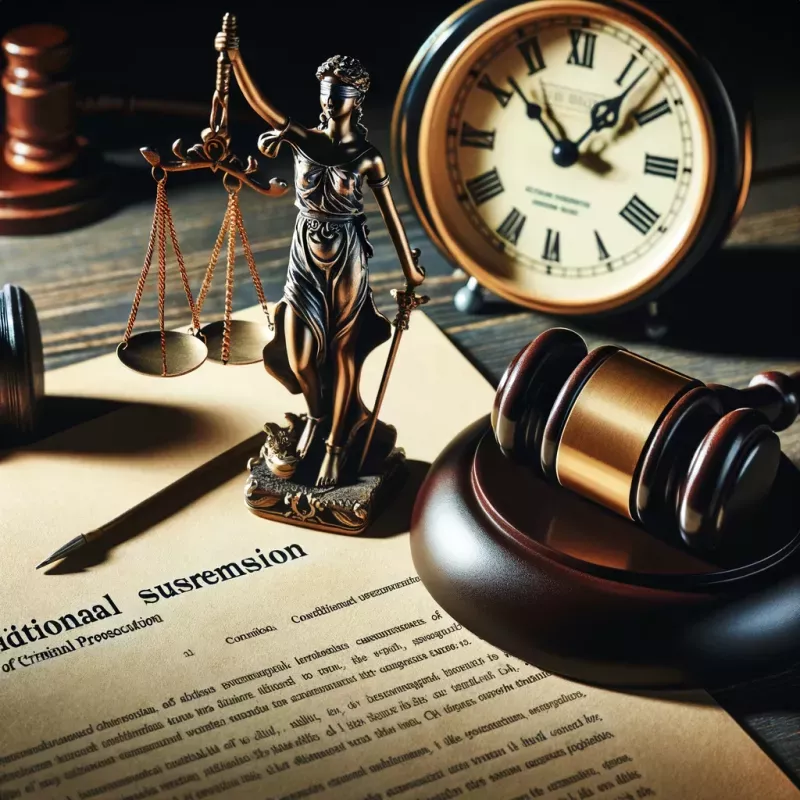Suspended prosecution
A criminal proceeding is a procedure regulated by law by the law enforcement authorities, the purpose of which is, among other things, to
- to determine whether a criminal offence has been committed,
- to determine who committed the offence,
- to impose a penalty on the perpetrator of the offence, and
- deciding on a claim for compensation for damage caused by the offence.

The general public is familiar from the media with the classic procedure in criminal proceedings, which consists of the investigation of the criminal case by the relevant police authorities, followed by a decision by the public prosecutor to file charges, which are then decided by the courts in the main trial or in a public session on appeal.
It is, however, less well known to the general public that the legislation in force, in particular Act No 141/1961 Coll., on Criminal Procedure (Criminal Procedure Code), as amended (hereinafter referred to as the "Criminal Procedure Code"), provides for alternative methods of resolving criminal proceedings, which are referred to by the professional public as so-called diversions in criminal proceedings. The aim of these diversions is to make the entire criminal proceedings faster and more efficient, both from the perspective of the accused themselves, for whom the conduct of criminal proceedings is often mentally and financially exhausting, and from the perspective of the overburdened judiciary.
At the same time, it must be stressed that these deviations are used especially in cases where
- the law enforcement authorities have indisputable evidence of the commission of the offence and the identity of the perpetrator,
- the offence is a less serious offence (so-called misdemeanours, which are all negligent and intentional offences with a maximum penalty of up to five years' imprisonment) and where
- these are first-time offenders.
It is not the ambition of this paper to provide a legal analysis of individual departures. The ambition is to draw the attention of our current and future clients to the main and most commonly used method of diversion, which may ultimately lead to their criminal case being resolved without judicial interference and, in particular, without the imposition of a sentence.
Conditional discontinuance of criminal prosecution as the most frequently used diversion is provided for in Sections 307 and 308 of the Code of Criminal Procedure.
Its essence is the procedure whereby, in proceedings concerning an offence, the court may, with the consent of the accused, and the public prosecutor in pre-trial proceedings, suspend the prosecution if
a) The accused confessed to the offence,
b) has compensated for the damage, if any, caused by the act, or has concluded an agreement with the victim on its compensation, or has taken other necessary measures to compensate for it,
c) he or she has released the unjust enrichment obtained by the offence, or has entered into an agreement with the injured party for its release, or has made other appropriate arrangements for its release,
and in view of the accused's personality, taking into account his previous life and the circumstances of the case, such a decision can reasonably be considered sufficient. The decision to suspend the prosecution includes a probationary period of 6 months to 2 years.
In more serious cases, where justified by the nature and gravity of the offence committed, the circumstances of its commission or the circumstances of the accused, the court and the public prosecutor in the preparatory proceedings may decide to suspend the prosecution only if the accused meets the conditions set out above and at the same time
a) undertakes to refrain from certain activities during the probationary period, or
b) deposits a sum of money on the account of the court and, in the preparatory proceedings, on the account of the public prosecutor's office, intended for the State to provide financial assistance to victims of crime in accordance with a special legal regulation, and that sum is not manifestly disproportionate to the seriousness of the offence,
all this on condition that, in view of the accused's personality, taking into account his previous life and the circumstances of the case, such a decision can reasonably be considered sufficient. In such a case, a probationary period of up to 5 years may be imposed.
For both of the above-mentioned variants of conditional discontinuance of criminal prosecution, if the accused has led a proper life during the probationary period, has fulfilled the obligation to compensate for the damage caused, has made restitution for unjust enrichment or has fulfilled any other obligation to which he has committed himself, and has complied with any other restrictions imposed, the President of the Chamber and the public prosecutor shall decide in the pre-trial proceedings that he has proved himself. In such a case, the criminal proceedings (prosecution) shall definitively end.
Otherwise, the President of the Chamber and the public prosecutor in the preparatory proceedings shall decide, possibly even during the probationary period, that the accused has not proved his or her guilt and that the prosecution shall continue.
Among the unquestionable advantages of the above procedure is the quick and inexpensive resolution of the case, where the accused does not have to undergo a demanding main hearing before the court, where no penalty is imposed on him and where he has no record on his record that could restrict his civil life.
For more information on the above, as well as other alternative methods of dealing with criminal proceedings, please contact our law firm.
